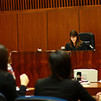Utah Divorce & Custody Dispute ProcessPearson Law Firm relies on word of mouth and good reviews in order to generate business. Therefore, your experienced Utah divorce attorney will do everything he can to make you happy, which generally means getting your case resolved as quickly as possible, but still preserve your rights and do what is in your best interest. Preparation is key when attempting to settle a case quickly, so Pearson Law Firm believes you should be as knowledgeable as possible when navigating through the Utah divorce process.
Complaint/Petition for Utah Divorce Complaint for Divorce Complaint for Divorce
The first step in filing for divorce in Utah is filing a Complaint for Divorce, often called a Petition for Divorce. This document is filed with the court by the Petitioner and basically informs the court and your spouse (the Respondent) as to your preferences for the terms of the Utah divorce. Once the Complaint is filed with the court, you must have it personally served upon your spouse by a non-interested party. Typically a process server or constable. Once your spouse, the Respondent, is served he/she has 21 days to respond to the complaint, failure to respond can result in a default judgment being awarded to the Petitioner.
Often the Respondent will file a Counter-Petition, essentially spelling out what he/she would like the terms of the Decree of Divorce to be. Typically there will be conflicting wishes/desires, and ultimately those are the issues that your attorney will resolve, either through settlement or trial. Temporary OrdersMost contested Utah divorces do not get resolved quickly, and generally by the time the initial paperwork is filed, the parties have separated. This often results in issues such as, who gets the kids and when? Does one of the parties require financial support (domestic support) in order to function? Who gets the car? Who gets the house? Etc. This is where Temporary Orders come in to play. Temporary Orders are orders from a Judge that govern the parties in a Utah divorce action until the Decree of Divorce is finalized, either by settlement or at trial. Temporary Orders are, by nature, not permanent, and are often changed during settlement negotiations, or overridden at trial.
In order to get Temporary Orders, a party must file a Motion for Temporary Orders, set a hearing date, and serve the other party with the Motion and Notice of the Hearing. Either the Petitioner or Respondent can initiate temporary orders, and like the initial petition, the other party always has the option to respond, and file his/her own motion for temporary orders, or counter-motion. The Commissioner (see the difference between a judge and commissioner) will then review the documents, hear from both sides at the hearing, and make a recommendation to the Judge as to how the parties should be governed. The Judge almost always signs off on the the commissioner's recommendations, and then the parties have a court order temporarily resolving issues such as custody/visitation, child support, alimony, division of assets, etc. Mediation Mediation Mediation
In every Utah divorce, mediation is required before the courts will do much. Once you file the Complaint/Petition for Divorce in Utah, the court will not decide any issues until the parties have made a good-faith effort to resolve the case in mediation. The only thing the court will hear before the parties have mediated is a Motion for Temporary Orders. And even then, it often makes sense to mediate first in order to avoid incurring legal fees for temporary orders that might have been unnecessary if the issues are resolved in mediation. Pearson Law Firm is a big advocate of mediation, and has found that it works nearly 70% of the time. Mediation is definitely a worthwhile endeavor, and your attorney will help you get the most out of the process, but ensure that your rights are preserved and you're not giving up too much in order to settle the case quickly.
Discovery Discovery in Divorce Discovery in Divorce
Discovery is the process by which parties obtain information from the other party, or from a third party. Each side can submit written requests for information, documents, or even testimony. Documents such as bank statements may be relevant to child support/alimony, or a party's work schedule might be relevant when determining custody/visitation.
Another discovery tactic often utilized is a Deposition. A deposition is a process where an attorney can interview the opposing party, or a witness, and ask him or her questions that might be relevant to the case. Generally its a fact-finding process, but it is often useful in settlement negotiations and trial. Settlement Settlement Handshake Settlement Handshake
By far, most Utah divorce cases settle before trial. Knowing when and if to settle is one of the most difficult decisions in a Utah divorce case. By nature a settlement takes compromise, and it can be hard to know when to take less. What are the chances you'll get what you want at trial? Is it worth the money to take a case all the way to trial? Your attorney at Pearson Law firm is experienced in family law, and will be able to counsel you as to whether a settlement offer is worth taking. His family law experience allows him to educate you as to what your chances at trial are. Your attorney can help you with a cost/benefit analysis, ie, if one of the Utah divorce issues is financial, are you better off going to trial and spending more on attorney fees, or are you better off taking a little less but saving on legal fees. Does it make sense to give up the boat in exchange for the car, knowing that there is always the possibility you might not get either at trial? Judge's are fickle, but your experienced Utah divorce attorney at Pearson Law Firm knows most Judges and his or her tendencies. This type of experience an insight can be invaluable, and this is the type of representation you can get at Pearson Law Firm.
Trial Utah Trial Utah Trial
Trial is the final stage in the Utah divorce process. This is the last resort if the parties have simply been unable to come to a resolution on their own. At trial, both sides will be able to state their case to the judge. Both sides can offer exhibits, such as bank statements, texts, emails, etc. Both sides can put witnesses on the stand that will testify on their client's behalf, and cross-examine witnesses that the opposing party puts on the stand. Utah Divorce trials can last a few hours, or take several days or even weeks, depending on the complexity of the issues. Your attorney at Pearson Law Firm has much trial experience, he is comfortable in front of a judge or jury, and is able to articulate the nuances of your case. If you've gotten to the point of trial, then generally that means you have a good case, and your experienced family law attorney will make sure that you are aggressively represented. Call Pearson Law Firm for a free consultation from an experienced Utah divorce attorney, 801-888-0991.
You're Divorced, Now What?Once your Utah divorce is finalized, there are still issues that may arise. Is your spouse ignoring the terms of the divorce? If so, you may have to bring him or her back to court by filing an Order to Show Cause, basically asking the court to find him or her in contempt and impose sanctions. Sanctions can range from fines, to jail time, or even loss of privileges such as custody/visitation. Or perhaps circumstances have changed and the Utah Decree of Divorce needs to be modified. In this scenario, you will need to file a Petition to Modify, and request that the decree be changed in some way, ie, visitation needs to be changed, or child support needs to decrease/increase. Regardless of the issue, and whether or not Pearson Law Firm represented you for the divorce itself, your experienced Utah Divorce Attorney can help you with post-divorce decree issues. Contact Pearson Law Firm today, 801-888-0991
|
Call for a free consultation today:
801-888-0991 Address:
Pearson Law Firm, PLLC 9192 South 300 West, Suite 35 Sandy, Utah 84070 |

|
|
|||
Copyright © 2015 Pearson Law Firm, PLLC
Address: 9192 South 300 West, Suite 35, Sandy, Utah 84070, Phone: 801-888-0991

